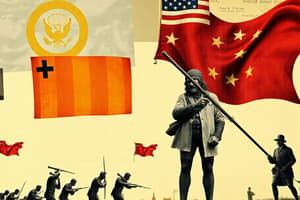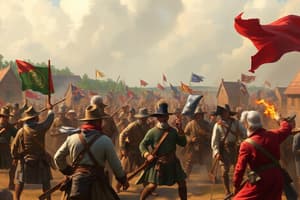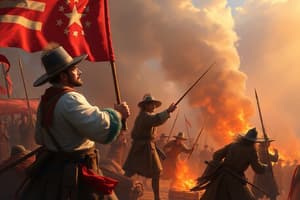Podcast
Questions and Answers
What was the purpose of the Sugar Act passed in 1764?
What was the purpose of the Sugar Act passed in 1764?
- To enforce stricter laws on colonial trade
- To tax all printed materials
- To raise funds for colonial defense
- To stop the smuggling of sugar and molasses (correct)
Which act was repealed by Parliament in 1766?
Which act was repealed by Parliament in 1766?
- The Coercive Acts
- The Townshend Acts
- The Stamp Act (correct)
- The Sugar Act
What event did the Sons of Liberty organize in December 1773?
What event did the Sons of Liberty organize in December 1773?
- Boston Massacre
- Committees of Correspondence
- Boston Tea Party (correct)
- First Continental Congress
What were the Intolerable Acts intended to address?
What were the Intolerable Acts intended to address?
Who was the leader of the Sons of Liberty?
Who was the leader of the Sons of Liberty?
What was established by the Quartering Act?
What was established by the Quartering Act?
What was the primary outcome of the Townshend Acts in 1767?
What was the primary outcome of the Townshend Acts in 1767?
What did the Proclamation of 1763 aim to do?
What did the Proclamation of 1763 aim to do?
What was a significant impact of the enlightenment on the American colonies?
What was a significant impact of the enlightenment on the American colonies?
What event is known as the Boston Massacre?
What event is known as the Boston Massacre?
Which group was formed to protect towns from foreign invasion?
Which group was formed to protect towns from foreign invasion?
Which Enlightenment thinker is known for the idea of popular sovereignty?
Which Enlightenment thinker is known for the idea of popular sovereignty?
What financial burden did the French and Indian War impose on British citizens?
What financial burden did the French and Indian War impose on British citizens?
What major action did the First Continental Congress take?
What major action did the First Continental Congress take?
Who were the Loyalists during the American Revolution?
Who were the Loyalists during the American Revolution?
What concept did Locke, Rousseau, and Hobbes collectively contribute to?
What concept did Locke, Rousseau, and Hobbes collectively contribute to?
What concept suggests that government authority comes from the consent of the governed?
What concept suggests that government authority comes from the consent of the governed?
Which of the following rights did John Locke assert as natural rights?
Which of the following rights did John Locke assert as natural rights?
Which aspect contributed to the colonists’ resentment of British control?
Which aspect contributed to the colonists’ resentment of British control?
What role did George Washington have before the American Revolution?
What role did George Washington have before the American Revolution?
Who was selected as the president of the First Continental Congress?
Who was selected as the president of the First Continental Congress?
How did the view of Britain change among the colonies between 1607 and 1776?
How did the view of Britain change among the colonies between 1607 and 1776?
What significant event followed the Boston Massacre and inspired action among the colonists?
What significant event followed the Boston Massacre and inspired action among the colonists?
Which colony did not send delegates to the First Continental Congress?
Which colony did not send delegates to the First Continental Congress?
What triggered the first battle of the American Revolution in Lexington?
What triggered the first battle of the American Revolution in Lexington?
What significant action did the Second Continental Congress take in 1775?
What significant action did the Second Continental Congress take in 1775?
Which group's approach was to appeal directly to King George III for assistance?
Which group's approach was to appeal directly to King George III for assistance?
What was the outcome of the Olive Branch Petition sent to King George III?
What was the outcome of the Olive Branch Petition sent to King George III?
What did the Declaration of Independence signify for the colonists?
What did the Declaration of Independence signify for the colonists?
Which influential document inspired the concepts included in the Declaration of Independence?
Which influential document inspired the concepts included in the Declaration of Independence?
What was a primary goal of the Continental Congress when it convened in 1775?
What was a primary goal of the Continental Congress when it convened in 1775?
In what way did King George III's rejection of the Olive Branch Petition affect the radicals?
In what way did King George III's rejection of the Olive Branch Petition affect the radicals?
Flashcards
American Revolution
American Revolution
The period where the American colonies successfully fought for independence from Great Britain.
Enlightenment
Enlightenment
An 18th-century European movement emphasizing reason and science in philosophy and societal study.
Militia
Militia
A local volunteer army of farmers, tradesmen, and laborers for local defense.
French and Indian War
French and Indian War
Signup and view all the flashcards
Popular Sovereignty
Popular Sovereignty
Signup and view all the flashcards
Patriot
Patriot
Signup and view all the flashcards
Loyalist
Loyalist
Signup and view all the flashcards
British Debt
British Debt
Signup and view all the flashcards
Proclamation of 1763
Proclamation of 1763
Signup and view all the flashcards
Sugar Act (American Revenue Act)
Sugar Act (American Revenue Act)
Signup and view all the flashcards
Stamp Act
Stamp Act
Signup and view all the flashcards
Townshend Acts
Townshend Acts
Signup and view all the flashcards
Sons of Liberty
Sons of Liberty
Signup and view all the flashcards
Boston Tea Party
Boston Tea Party
Signup and view all the flashcards
Intolerable Acts
Intolerable Acts
Signup and view all the flashcards
Quartering Act
Quartering Act
Signup and view all the flashcards
Boston Massacre
Boston Massacre
Signup and view all the flashcards
Committees of Correspondence
Committees of Correspondence
Signup and view all the flashcards
Natural Rights
Natural Rights
Signup and view all the flashcards
First Continental Congress
First Continental Congress
Signup and view all the flashcards
Colonial Independence
Colonial Independence
Signup and view all the flashcards
Social Contract
Social Contract
Signup and view all the flashcards
American Revolution Initial Actions
American Revolution Initial Actions
Signup and view all the flashcards
Battles of Lexington and Concord
Battles of Lexington and Concord
Signup and view all the flashcards
Second Continental Congress
Second Continental Congress
Signup and view all the flashcards
Continental Army
Continental Army
Signup and view all the flashcards
Olive Branch Petition
Olive Branch Petition
Signup and view all the flashcards
Declaration of Independence
Declaration of Independence
Signup and view all the flashcards
Drafting the Declaration
Drafting the Declaration
Signup and view all the flashcards
Study Notes
Causes of the American Revolution
- Enlightenment ideas spread through the colonies, decreasing loyalty to the British king.
- The cost of the French and Indian War increased Britain's debt and led to increased taxes.
- British citizens were paying one-third of their salaries in taxes.
- Colonists opposed being taxed without representation in Parliament.
- The Proclamation of 1763 forbade colonial settlement of western lands.
- The Sugar Act (1764) and Stamp Act (1765) imposed taxes on printed materials and sugar/molasses, furthering colonial resentment.
- The Townshend Acts (1767) sparked protests from groups like the Sons of Liberty.
- The Boston Massacre (1770) increased colonial outrage toward British troops.
- The Intolerable Acts (1774) aimed to punish colonists for the Boston Tea Party.
- Colonists protested by boycotting British goods and forming militias.
- The First Continental Congress (1774) met, showcasing colonial unity against Britain.
- The Battles of Lexington and Concord (1775) marked the beginning of the American Revolutionary War.
- The Second Continental Congress (1775) declared independence.
- The Declaration of Independence (1776) outlined colonial grievances, justifying their separation from Britain.
- The choice was to support independence or remain loyal to Britain.
Glossary
- Enlightenment: A movement emphasizing reason and science in philosophy.
- Militia: A volunteer army for local defense.
- George Washington: Served in the Virginia militia, and legislature.
- Mercenary: A soldier fighting for pay in a foreign army.
- Popular Sovereignty: Government authority derived from consent of the governed.
- Patriot: Someone who supported American independence.
- Loyalist: Someone loyal to the British during the Revolution.
Britain and the American Colonies
- Britain paid little attention to the colonies before 1763, which were approximately 3000 miles away.
- Colonists developed self-rule but remained loyal to the British Crown.
- Colonists felt connected to Britain and believed that British protection prevented conflict with other countries.
- Britain was viewed as a trustworthy trade partner and maritime protector for the colonies.
- British control led to resentment in the colonies.
Studying That Suits You
Use AI to generate personalized quizzes and flashcards to suit your learning preferences.




